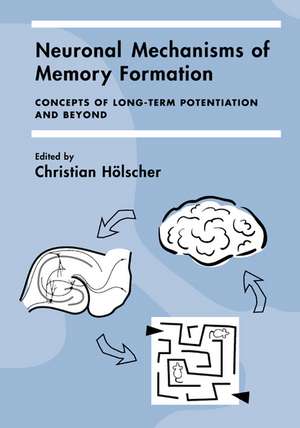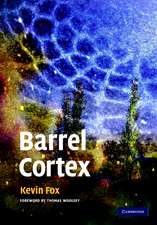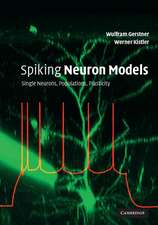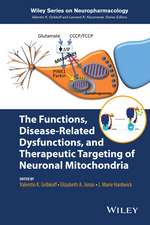Neuronal Mechanisms of Memory Formation: Concepts of Long-term Potentiation and Beyond
Editat de Christian Hölscheren Limba Engleză Paperback – 28 sep 2005
Preț: 437.27 lei
Nou
Puncte Express: 656
Preț estimativ în valută:
83.67€ • 87.59$ • 69.23£
83.67€ • 87.59$ • 69.23£
Carte tipărită la comandă
Livrare economică 05-19 aprilie
Preluare comenzi: 021 569.72.76
Specificații
ISBN-13: 9780521018036
ISBN-10: 052101803X
Pagini: 508
Ilustrații: 66 b/w illus. 6 tables
Dimensiuni: 178 x 258 x 30 mm
Greutate: 0.87 kg
Ediția:Revised
Editura: Cambridge University Press
Colecția Cambridge University Press
Locul publicării:Cambridge, United Kingdom
ISBN-10: 052101803X
Pagini: 508
Ilustrații: 66 b/w illus. 6 tables
Dimensiuni: 178 x 258 x 30 mm
Greutate: 0.87 kg
Ediția:Revised
Editura: Cambridge University Press
Colecția Cambridge University Press
Locul publicării:Cambridge, United Kingdom
Cuprins
General Introduction: Long-term potentiation as a model for learning mechanisms: 'the story so far' Christian Hölscher; Part I. LTP In Vitro and in Vivo: How Can We Fine-Tune the Current Models for Memory Formation?: 1. Persisting with LTP as a memory mechanism: clues from variations in LTP maintenance Wickliffe C. Abraham; 2. LTP in the amygdala: implications for memory Michael T. Rogan, Marc G. Weisskopf, Yan-You Huang, Eric R. Kandel and Joseph E. LeDoux; 3. Multiple roles for synaptic plasticity in Pavlovian fear conditioning Stephen Maren; 4. Plasticity of the hippocampal cellular representation of space Kathryn J. Jeffrey; Part II. There is More to the Picture than LTP: Theta or Gamma Oscillations in the Brain and the Facilitation of Synaptic Plasticity: 5. Synaptic potentiation by natural patterns of activity in the hippocampus: implications for memory formation Fenella Pike, Sturla Molden, Ole Paulsen and Edvard I. Moser; 6. Plasticity in local neuronal circuits: in-vivo evidence from rat hippocampus and amygdala Mouna Maroun, Dan Yaniv and Gal Richter-Levin; 7. Theta-facilitated induction of LTP: a better model for memory formation? Christian Hölscher; 8. Neuronal processing of information in the neocortex and the role of gamma-oscillations in perception and memory formation Matthias H. J. Munk; Part III. Making Models from Empirical Data of Synaptic Plasticity: 9. Towards a physiological explanation of behavioural data on human memory: the role of theta-gamma oscillations and NMDAR-dependent LTP John Lisman, Ole Jensen and Michael Kahana; 10. Neuronal networks, synaptic plasticity, and memory systems in primates Edmund T. Rolls; 11. Revisiting the LTP orthodoxy: plasticity versus pathology Jill C. McEachern and Christopher A. Shaw; 12. Long-term potentiation and associative learning: can the mechanism subserve the process? Louis D. Matzel and Tracey J. Shors; Part IV. Setting the Stage for Memory Formation: Stress, Arousal and Attention: 13. Strategies for studying the role of LTP in spatial learning: what do we know? Where should we go? Donald P. Cain; 14. What studies in old rats tell us about the role of LTP in learning Gregory M. Rose and David M. Diamond; 15. Implications of the neuropsychology of anxiety for the functional role of LTP in the hippocampus Neill McNaughton; 16. Differential effects of stress on hippocampal and amygdaloid LTP: insight into the neurobiology of traumatic memories David M. Diamond, Collin R. Park, Michael J. Puls and Gregory M. Rose; Part V. Transgenic Mice as Tools to Unravel the Mechanisms of Memory Formation: 17. In vivo recording of single cells in behaving transgenic mice Yoon H. Cho and Howard B. Eichenbaum; 18. Understanding synaptic plasticity and learning through genetically modified animals Paul F. Chapman; 19. What can gene activation tell us about synaptic plasticity and the mechanisms underlying the encoding of the memory trace Sabrina Davis and Serge Laroche; Conclusions and future targets Christian Hölscher, Gal Richter-Levin and Timothy V. P. Bliss.
Recenzii
"...this volume can be recommended for those who wish to succinctly survey the current state of science... This book offers a timely collection of well-written articles..." Timothy J. Teyler, Quarterly Review of Biology
Descriere
An international group of scientists discuss the latest work on long-term potentiation (LTP), a model for encoding memory.










